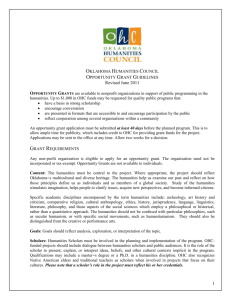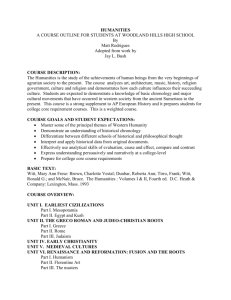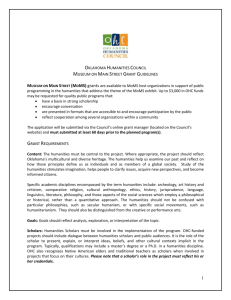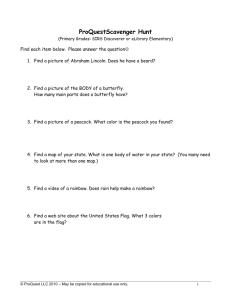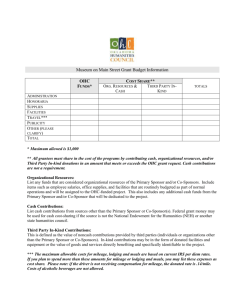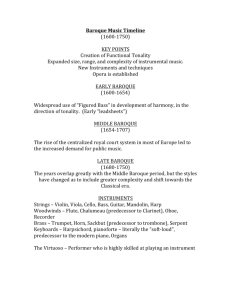Newsletter - Oregon Humanities Center
advertisement
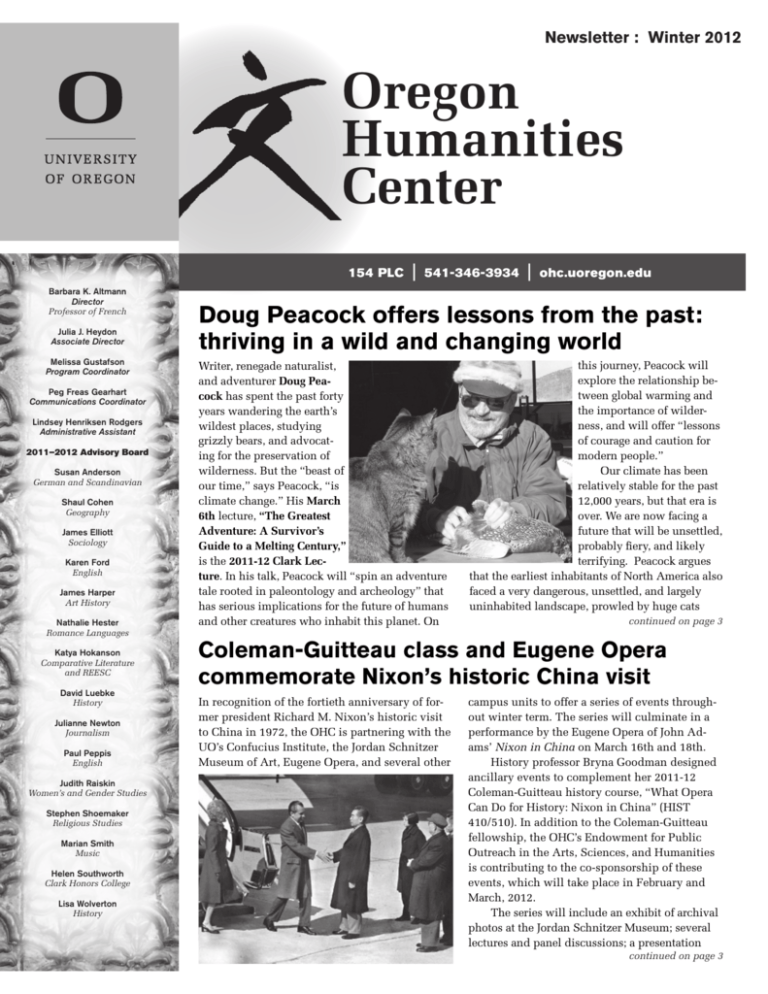
Newsletter : Winter 2012 Oregon Humanities Center 154 PLC Barbara K. Altmann Director Professor of French Julia J. Heydon Associate Director Melissa Gustafson Program Coordinator Peg Freas Gearhart Communications Coordinator Lindsey Henriksen Rodgers Administrative Assistant 2011–2012 Advisory Board Susan Anderson German and Scandinavian Shaul Cohen Geography James Elliott Sociology Karen Ford English James Harper Art History Nathalie Hester Romance Languages Katya Hokanson Comparative Literature and REESC David Luebke History Julianne Newton Journalism Paul Peppis English Judith Raiskin Women’s and Gender Studies Stephen Shoemaker Religious Studies Marian Smith Music Helen Southworth Clark Honors College Lisa Wolverton History | 541-346-3934 | ohc.uoregon.edu Doug Peacock offers lessons from the past: thriving in a wild and changing world Writer, renegade naturalist, and adventurer Doug Peacock has spent the past forty years wandering the earth’s wildest places, studying grizzly bears, and advocating for the preservation of wilderness. But the “beast of our time,” says Peacock, “is climate change.” His March 6th lecture, “The Greatest Adventure: A Survivor’s Guide to a Melting Century,” is the 2011-12 Clark Lecture. In his talk, Peacock will “spin an adventure tale rooted in paleontology and archeology” that has serious implications for the future of humans and other creatures who inhabit this planet. On this journey, Peacock will explore the relationship between global warming and the importance of wilderness, and will offer “lessons of courage and caution for modern people.” Our climate has been relatively stable for the past 12,000 years, but that era is over. We are now facing a future that will be unsettled, probably fiery, and likely terrifying. Peacock argues that the earliest inhabitants of North America also faced a very dangerous, unsettled, and largely uninhabited landscape, prowled by huge cats continued on page 3 Coleman-Guitteau class and Eugene Opera commemorate Nixon’s historic China visit In recognition of the fortieth anniversary of former president Richard M. Nixon’s historic visit to China in 1972, the OHC is partnering with the UO’s Confucius Institute, the Jordan Schnitzer Museum of Art, Eugene Opera, and several other campus units to offer a series of events throughout winter term. The series will culminate in a performance by the Eugene Opera of John Adams’ Nixon in China on March 16th and 18th. History professor Bryna Goodman designed ancillary events to complement her 2011-12 Coleman-Guitteau history course, “What Opera Can Do for History: Nixon in China” (HIST 410/510). In addition to the Coleman-Guitteau fellowship, the OHC’s Endowment for Public Outreach in the Arts, Sciences, and Humanities is contributing to the co-sponsorship of these events, which will take place in February and March, 2012. The series will include an exhibit of archival photos at the Jordan Schnitzer Museum; several lectures and panel discussions; a presentation continued on page 3 2 Oregon Humanities Center | winter 2012 Sweet Honey in the Rock founder presents Freedom Songs As part of the 2011-12 “Conflict” series, the OHC is pleased to co-sponsor renowned musician, scholar, and civil rights activist Dr. Bernice Johnson Reagon in a “songtalk” performance on Thursday, February 16th at 7:30 p.m. in Beall Hall. Reagon’s UO visit is in celebration of Black History Month. She is the founder of the highly acclaimed a cappella group Sweet Honey in the Rock, and a professor emeritus at American University in Washington, D.C. She is also a curator emeritus at the Smithsonian’s National Museum of American History, and was an original member of the Student Non-Violent Coordinating Committee’s Freedom Singers in 1962. Reagon says, “I was born among singing. I don’t know of breathing or eating, without singing. I don’t mean from the radio (a wonderful invention) or from the iPod (another wonderful invention). I mean [singing] like walking and talking, like the air you breathe, so you didn’t define it in any particular way, because it was woven inside the you you came to know, the house you grew up in, the yard you played in, the school you went to, the church you went to. It was singing by the people around you.” In her February 16th performance she will sing Freedom Songs from the Civil Rights movement, and discuss her organizing experiences in the South during that time. Above: Bernice Johnson Reagon (center) with Sweet Honey in the Rock. Left: SNCC Freedom Singers in 1962 (left to right) Charles Neblett, Bernice Johnson, Cordell Reagon, and Rutha Mae Harris Dr. Reagon’s performance is sponsored by the School of Music and Dance, the Oregon Humanities Center, ASUO, University Housing, and the Office of Institutional Equity and Diversity. It is free and open to the public. For more information, call (541) 346-5678. Baroque trio performs music of Telemann and four Bachs The Dutch Masters Trio, a group of internationally acclaimed early music performers, will grace the Beall Hall stage on Friday, February 24th at 8 p.m. in a concert of baroque chamber music. The performers are Jacques Ogg, harpsichord; Wilbert Hazelzet, baroque flute; and Jaap ter Linden, cello. Their program will include chamber music works by J.S. Bach, C.P.E. Bach, W.F. Bach, J.C.F. Bach, and Telemann. Jacques Ogg (harpsichord and fortepiano) graduated from the Amsterdam Conservatory in 1974, where he studied with Gustav Leonhardt. He currently teaches at the Royal Conservatory in the Hague in addition to maintaining an active career as a performer, conductor, and recording artist. Ogg has been a member of the Orchestra of the 18th Century and has performed regularly with Concerto Palatino. He is the artistic director of Lyra Baroque Orchestra in Minneapolis/ St. Paul. Wilbert Hazelzet, considered by many to be one of the world’s leading flauto traverso players, has dedicated himself to the study of baroque flute for over forty years. He was a member of Musica Antiqua Köln, and more recently has served as the principle flutist in Ton Koopman’s Amsterdam Baroque Orchestra. He also frequently performs duos with harpsichordist Jacques Ogg and lutenist Konrad Junghänel. He has recorded extensively, and is a professor at the Royal Conservatory in the Hague. Cellist Jaap ter Linden has been at the forefront of the early music movement since its inception. Early in his career he was involved with Musica da Camera, Musica Antiqua Köln, The English Concert, and the Amsterdam Baroque Orchestra. He founded the Mozart Akademie, and is a regular guest director and soloist with the Canadian Arion Ensemble. He has an extensive, awardwinning discography as both a performer and a conductor. In 2006 he released his second recording of the Bach Cello Suites. He has recently expanded his musical horizons to include the conducting of baroque opera. The concert, part of the School of Music and Dance’s “Guest Artist Series,” is co-sponsored by the OHC’s Endowment for Public Outreach in the Arts, Sciences, and Humanities and the American Guild of Organists. Admission is $10 general/$8 students and seniors. For more information call (541) 346-5678. Oregon Humanities Center | winter 2012 OHC Director’s Report Barbara K. Altmann Our choice of “conflict” for this year’s theme has proved to be particularly apt. I write this the day after the U.S. formally pulled out of Iraq, yet the fallout of the wars this country is engaged in is far from over. Not surprisingly, war surfaced as a predominant thread for our programming. We began our year with the Tzedek lecture by Stacy Bannerman, pointing out the many ways National Guard members and their families need improved support when the Guard is deployed for active service. Our first-ever film premiere—three screenings of the documentary In the Telling—showcased the transition of returning vets back into their communities. We will close the year with the Kritikos lecture in May by Andrew Bacevich [see back page]. Bacevich has received considerable attention in the press lately as a critic of U.S. military engagement, a position he takes as both a retired Army career officer and the parent of a soldier killed in Iraq. Other forms of conflict abound, of course, ranging from the very local to the national and global. In November as our Cressman lecturer, Paul Gilding took on the economic crisis, its evolution, and its eventual consequences. Despite the dire nature of the changes he foresees, Gilding takes an optimistic view of how human response will push for major reforms as the systems we know collapse. His optimism is a bright spot in the doom and gloom. From our perspective, keeping the conversation alive in the community is one crucial step in pushing forward. Please look at the ample events calendar included in this newsletter and join us for anything that catches your attention. As always, I encourage you to make use of the many lectures and interviews we put on line as well as attending in person. On another piece of OHC business: we had our largest-ever cohort of teaching and research fellows this year. The quality and quantity of humanist research emanating from all segments of UO is dazzling. We can support only a fraction of these applications, and are always searching for funds to support more. Lastly, I have the privilege of taking two terms of sabbatical this year. I will continue to consult on Center business while on leave, but you won’t see much of me in winter and spring quarters. The rest of our dedicated staff will handle business as usual, and will know where to find me. I’ll be back in June, having spent six months with a splendid late-medieval 2011-12 theme manuscript in UO Special Collections. In the meantime, may the new year begin gently and bring productive transitions in all things great and small. Nixon continued from front page by Peter Sellers, who originally commissioned the opera and recently directed a Metropolitan Opera performance of the work; a keynote address by former Ambassador Nicholas Platt, who was a participant in the Nixon/Kissinger entourage; and the opera performance itself. For details about individual events, visit the Nixon in China event website, nixoninchinaeugene.com, or consult the OHC winter term newsletter calendar. Peacock continued from front page and gigantic bears. He will compare the global changes that occurred at the end of the Pleistocene era with what is happening in today’s world. Are there valuable parallels between the world of the First Americans and today? This is the territory Peacock hopes to explore in his talk. A Vietnam veteran, former Green Beret medic, and close friend of Edward Abbey, Doug Peacock was the real-life model for Abbey’s character George Washington Hayduke in The Monkey Wrench Gang. Peacock was named a 2007 Guggenheim Fellow, and a 2011 Lannan Fellow. He is the author of Grizzly Years; Baja; and Walking it Off: A Veteran’s Chronicle of War and Wilderness. His latest book, co-written with his wife Andrea Peacock, is The Essential Grizzly: The Mingled Fates of Men and Bears. He is currently working on a book about archeology, climate change, and the peopling of North America. The lecture will take place at 7:30 p.m. in 182 Lillis Hall, and is free and open to the public. It will be followed by a book sale and signing. It can be viewed as live-streaming video at ohc.uoregon.edu. For more information, call (541) 346-3934. 3 FIRST-CLASS MAIL PRESORTED U.S. POSTAGE PAID EUGENE OR PERMIT NO. 63 OREGON HUMANITIES CENTER 5211 University of Oregon Eugene OR 97403-5211 ADDRESS SERVICE REQUESTED This newsletter is also available on our website: ohc.uoregon.edu If you would like to be taken off our mailing list 541-346-3934 or send an e-mail to: lhenrik2@uoregon.edu. Upcoming WIPs We continue our series of work-in-progress talks by OHC research fellows on their current or recent work on Fridays at noon in the Humanities Center Conference Room, 159 PLC. All are welcome to attend. Brown-bag lunches are welcome. The conference room seating is limited; early arrival is recommended. January 27 Katharine Meehan, Geography, Faculty Teaching Fellow, “All the Pieces Matter: Political Geographies of the Object” February 3 Christopher McGill, English, Graduate Dissertation Fellow, “Figuring the Beast: The Aesthetics of Animality in American Literature, 1900-1979” February 10 Emily Gilkey, History, Graduate Research Support Fellow, “Lover, Husband, Friend: Marriage and Infertility in Nineteenth-Century Lyon” February 17 Yu Zhang, East Asian Literatures and Languages, Graduate Dissertation Fellow, “The Female Rewriting of Grand History: The tanci fiction Jing zhong zhuan (The Biography of Yue Fei)” March 2 Robert Haskett, History, Faculty Research Fellow, “Nahautl Documents and New Conquest History” The University of Oregon is an equal opportunity, affirmative action institution committed to cultural diversity and compliance with the Americans with Disabilities Act. To arrange disability accommodations for Humanities Center events or to obtain this newsletter in an alternative format, call 541-346-3934. Looking Ahead: Andrew Bacevich speaks in May The OHC is pleased to host Andrew Bacevich, retired career U.S. Army officer, Vietnam veteran, and an outspoken critic of American foreign policy, as the 2011-12 Kritikos Professor in the Humanities. Bacevich is a professor of international relations at Boston University, and the author of several books, including The Limits of Power: The End of American Exceptionalism (2008) and Washington Rules: America’s Path to Permanent War (2010). His only son was killed in action in Iraq by an improvised explosive device in 2007, but his opposition to that war dates back to its inception. Bacevich forcefully denounces the militarization that he says has become a routine, unremarked-upon part of our daily lives. He sees both Republicans and Democrats as sharing responsibility for policies which may not be in the nation’s best interest. His lecture, “A Decade of War,” will take place on May 15 in Eugene and May 16 in Portland. Look for details in our spring newsletter.
